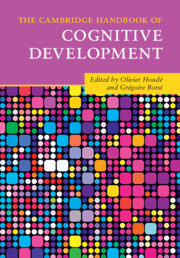Book contents
- The Cambridge Handbook of Cognitive Development
- The Cambridge Handbook of Cognitive Development
- Copyright page
- Contents
- Figures
- Tables
- Contributors
- Introduction
- Part I Neurobiological Constraints and Laws of Cognitive Development
- Part II Fundamentals of Cognitive Development from Infancy to Adolescence and Young Adulthood
- Part III Education and School-Learning Domains
- 25 Linking Cognitive Neuroscientific Research to Educational Practice in the Classroom
- 26 Literacy
- 27 Reasoning in Mathematical Development
- 28 Children’s Scientific Reasoning Skills in Light of General Cognitive Development
- 29 Working Memory Training
- 30 Interventions for Improving Executive Functions during Development
- 31 Curiosity-Driven Learning in Development
- 32 Neurocomputational Methods
- Index
- Plate Section (PDF Only)
- References
28 - Children’s Scientific Reasoning Skills in Light of General Cognitive Development
from Part III - Education and School-Learning Domains
Published online by Cambridge University Press: 24 February 2022
- The Cambridge Handbook of Cognitive Development
- The Cambridge Handbook of Cognitive Development
- Copyright page
- Contents
- Figures
- Tables
- Contributors
- Introduction
- Part I Neurobiological Constraints and Laws of Cognitive Development
- Part II Fundamentals of Cognitive Development from Infancy to Adolescence and Young Adulthood
- Part III Education and School-Learning Domains
- 25 Linking Cognitive Neuroscientific Research to Educational Practice in the Classroom
- 26 Literacy
- 27 Reasoning in Mathematical Development
- 28 Children’s Scientific Reasoning Skills in Light of General Cognitive Development
- 29 Working Memory Training
- 30 Interventions for Improving Executive Functions during Development
- 31 Curiosity-Driven Learning in Development
- 32 Neurocomputational Methods
- Index
- Plate Section (PDF Only)
- References
Summary
The desire to understand and explain patterns and regularities in terms of causal laws is part of human nature. This search for knowledge contributes to making the world predictable as well as controllable, and it enables the invention and production of technologies that help to improve quality-of-life. Although debates about criteria for good causal explanations and conclusive evidence are still a controversial topic of epistemology and theory of science, some widely accepted standards for scientific reasoning have emerged. The distinction between explanation and observation, and the control of variables strategy (CVS) for designing and evaluating experiments are two widely accepted concepts. Mastering the CVS means to vary only the levels of the focal variable in experimental designs while keeping all other potentially confounding variables constant across conditions.
Information
- Type
- Chapter
- Information
- The Cambridge Handbook of Cognitive Development , pp. 585 - 605Publisher: Cambridge University PressPrint publication year: 2022
References
Accessibility standard: Unknown
Why this information is here
This section outlines the accessibility features of this content - including support for screen readers, full keyboard navigation and high-contrast display options. This may not be relevant for you.Accessibility Information
- 3
- Cited by
